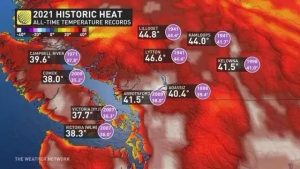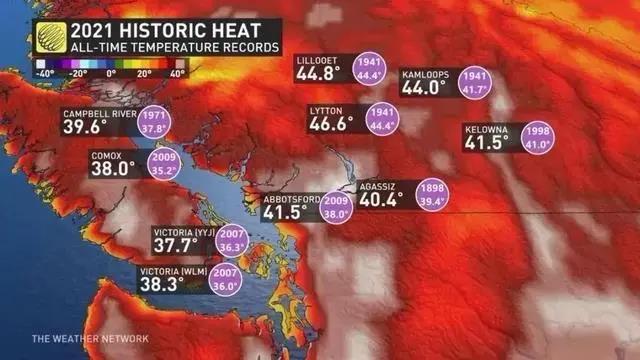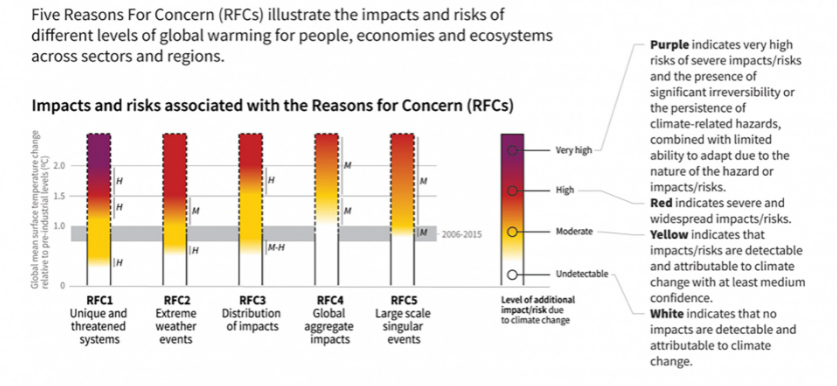
In the summer of 2021, the world is experiencing the “bake” experience of the scorching sun: the United States, Canada and other countries have successively experienced extreme high temperature weather, and the high temperature records in Kuwait, Algeria, Denmark and Greenland have also been broken month by month.

High temperature records across the U.S.
Looking at the country, even if the recent heavy rains are frequent, it has not affected the heat wave in the slightest. On August 1, high temperatures above 40°C occurred in many parts of my country.
Why are there frequent heat waves this year? What are the effects of hot weather on the body?
Nature: Frequent heat waves now depend on climate change
The World Meteorological Organization recommends that the standard for high-temperature heat waves is that the daily maximum temperature is higher than 32°C and lasts for more than 3 days. Since the summer of 2021, high temperature records around the world are being broken month by month.
In late June, the temperature in Portland, USA reached 46.7℃;
Litton, Canada, set a national record of the highest temperature of 49.6°C, which exceeded the normal summer high temperature by 15°C.
According to 2020 research data released by the National Bureau of Economic Research, 3.5 billion people worldwide will face the threat of high temperature.
On July 26, a model analysis published in the British journal Nature Climate Change showed that climate change has increased the probability of record-breaking heat waves, and the degree of increase does not depend on the number of occurrences, but more on the rate of warming.

The Swiss Federal Institute of Technology Zurich’s research team used climate models and reanalysis to explore how the probability of record-breaking heat waves changes with global warming. According to the low to high carbon dioxide emissions, the climate model is simulated in different scenarios to observe the week-long, record-breaking heat wave.
In high-emission scenarios, the probability of record-breaking extreme heat waves from 2021 to 2050 is 2 to 7 times that of the past 30 years, and from 2051 to 2080, the probability will be 3 to 21 times.
In addition, in the mid-latitudes of the northern hemisphere, these events will occur every 6 to 37 years from 2051 to 2080.
Studies have found that these record-breaking events occur suddenly in times of accelerating climate warming. But when there is no warming or less warming, these events are less likely to happen.
On hot days, 4 kinds of diseases are the easiest to “hot”
In high-temperature weather, in addition to making people feel hot and unbearable, the body will also have some “negative reactions.” For some people with poor physique, summer weather is like torture.
Heatstroke
Emotions get out of control
The high temperature will lead to a sharp increase in the risk of heat stroke, and even the emotions will follow the heat stroke. After heatstroke, symptoms such as dizziness, nausea, and pale complexion may appear, and may even be life-threatening.
Emotional heatstroke is medically called summer affective disorder syndrome. The main symptoms are irritability, irritability, and disordered thinking.
Countermeasure
Minimize going out on hot days, take measures to prevent heatstroke and cool down, and strengthen the body’s heat resistance through proper physical exercise. Eat more fresh fruits and vegetables, drink green tea, and eat less greasy food.
Do a good job of psychological adjustment, and learn to shift emotions when encountering things that don’t go well, and don’t be too arrogant.
Air Conditioning Disease
The blood vessels collapse first
In the sweltering and sweltering weather, the air conditioner has become a “life-sustaining artifact”, and air-conditioning diseases caused by improper air-conditioning will also follow.
Frequent entering and leaving the air-conditioned room, the blood vessels contract and expand suddenly, which may induce diseases such as myocardial infarction and cerebral infarction, especially the elderly with basic diseases and weak blood vessels are more likely to be recruited.

Countermeasure
Don’t look forward to staying in an air-conditioned room in summer, especially for the elderly with a history of cerebral infarction and hypertension.
The temperature of the air conditioner should not be lower than 26°C, and the doors and windows should be opened at regular intervals for ventilation.
Go outdoors in the morning and evening to breathe fresh air to strengthen the body’s adaptability.
skin disease
Increased allergies
Summer is the season of outdoor play, and many people choose water sports. Little do they know that such a “scorching sun bath” is likely to cause skin damage, such as peeling and blisters. At the same time, summer is a period of high incidence of allergies, and many people will experience allergic symptoms.
70% of allergies in summer are caused by mosquito bites. Pets have parasites, which can easily be brought to people. Children with weaker physique and poor antigenicity are most likely to be allergic to mosquito bites.
Countermeasure
Before going out on a hot day, you should try to apply sunscreen and take protective measures. After the skin is exposed to the sun, it is best to wipe the sweat with a dry towel, and then apply a cold towel to the skin for a while.
If you are allergic to mosquito bites, you can take some antihistamines and apply some lotions or lotions containing calamine. Try not to use wind oil and toilet water. These products can only temporarily relieve the itching, not a radical cure, and can also cause secondary allergies.
Gastrointestinal disease
Gastrointestinal disorders easily
Hot weather is when the gastrointestinal function is weakest, and a little carelessness can cause various gastrointestinal diseases, especially the increase in patients with diarrhea. Greed to drink cold can easily cause cold and dampness. For this type of diarrhea, do not abuse antibiotics.

Countermeasure
Must pay attention to food hygiene and reasonable diet. Especially young children’s body organs are still in the developmental stage, and their digestive functions are not yet perfect. In particular, they must control the consumption of cold drinks to prevent colds.
This kind of high temperature disease has the highest risk factor
One of the most terrifying situations in the face of high-temperature grilling is “heat stroke”, which is severe heat stroke.
Heat stroke mainly refers to the dysfunction of human body temperature regulation in the continuous sultry environment, sweat cannot be discharged in time, heat accumulates in organs and muscle tissue, causing symptoms such as dry skin and increased muscle temperature, which then affects the function of organs and tissues throughout the body.
At this time, there will be local muscle cramps, high fever, no sweat, dry mouth, coma, elevated blood pressure, difficulty breathing and even multiple organ failure. If not treated in time, the mortality rate is as high as 40%~50%.
Heat stroke usually occurs in the muggy weather with high temperature and humidity in summer. The following types of people are most vulnerable to sneak attacks:
Sanitation workers and construction workers who work outdoors for a long time;
People who stay in closed rooms or cars for a long time;
People with chronic diseases, especially cardiovascular and cerebrovascular diseases;
The frail elderly, children and pregnant women, etc.
It should be reminded that heat stroke is not only caused by outdoor exposure, but indoor small environments with poor ventilation and high temperature may also cause heat stroke. Therefore, when there is profuse sweating, trance, etc., we must be vigilant.
If a coma occurs, immediately lift the patient to a ventilated and cool place, unbutton the button and belt, and apply a cold towel to the armpits, head and neck, and groin, or pour cold water to lower the body temperature of the comatose, and add water appropriately.
Body temperature continues to rise after emergency treatment, you can soak the lower body in warm water in the bathtub and wipe the upper body with a wet towel. When the high fever persists at around 40℃, it indicates that the condition is very dangerous and needs to be sent to the hospital for treatment immediately.
4 ways to upgrade the body’s “thermal adaptation” ability
Under the conditions of high temperature and humidity, the human body sweats a lot and the oxygen content of the air is low, which will make the heart beat faster and increase the oxygen consumption of the myocardium, which in turn increases the pumping load of the heart. In order to maximize the decompression of the body, it is recommended to do the following in summer to help the body adapt to the high temperature:
clothes
Four points of dressing in summer: light, light, breathable and sweat-absorbent.
Clothes are recommended to be made of natural fiber fabrics such as cotton, linen, silk, shoes can be breathable sandals or sports shoes with mesh, socks are best to choose cotton socks.
Sunglasses, sun hats or parasols should be worn when going out on a sunny day. It is recommended to apply a waterproof sunscreen with a sun protection factor (SPF) higher than 15 before going out, and reapply it every two hours after going out.

It should be noted that the less you wear in summer, the cooler you will be. Generally, when the skin temperature is higher than the temperature, exposing the limbs and back helps to dissipate heat, but when the temperature exceeds 37°C, the skin starts to absorb heat from the outside. Wearing less can expose the skin to ultraviolet light, increasing the possibility of burns.
In hot weather, especially when the sun is more toxic, it is recommended to wear loose long clothes and trousers, especially the neckline, chest, waist, cuffs and trousers should not be tight.
Diet
Due to increased sweating, be especially alert for signs of dehydration in summer. For example, you can observe the color of urine:
The urine is very light, indicating that there is no shortage of water;
When the urine is dark yellow, it means that the body is dehydrated and should be refilled in time.
Drink water
In summer, adults drink about 2,000 ml of water per day. Those who exercise vigorously or work at high temperatures should increase it appropriately, but avoid sweet and alcoholic beverages.
If the humidity is not high, it is recommended to drink warm water in hot weather to help the body dissipate heat. But when the humidity is high, you can consider drinking it cold and boiled.
diet
Watermelon, cucumber, tomato and other fruits and vegetables contain more water. Eating some appropriately is good for heart health. It should be reminded that people with heart disease should not eat cold foods. Therefore, it is not recommended to eat watermelon iced. You can put it in cold water before eating it at the right temperature.
Vegetables and beans can be paired with chicken, fish, etc. to make salads or cold dishes. It is recommended to choose salt-free condiments, such as spices, lemon juice, etc.
Exercise
From 12 noon to 1 pm, the sun is strong, and heatstroke or dehydration are most likely to occur. At this time, you should try to avoid going out. It is recommended to exercise indoors, such as gyms, swimming pools, etc. At the same time, attention should be paid to indoor ventilation. You can also exercise before 10 in the morning or in the evening.

After outdoor sports in summer, people usually “sweat profusely”. At this time, if you enter a cool air-conditioned room or take a cold shower immediately, it is easy to induce myocardial infarction. It is recommended to sit and rest, and take a shower with warm water slightly higher than body temperature 1~2℃ when you no longer sweat.
Sleep
In summer, the days are long and the nights are short, and the weather is muggy, and many people lack sleep, which creates hidden dangers for cardiovascular and cerebrovascular diseases. It is recommended to get seven or eight hours of sleep every night, and take a shower 1.5 hours before going to bed, but the water temperature should not be too low. A warm shower can lower your body temperature.
Comments